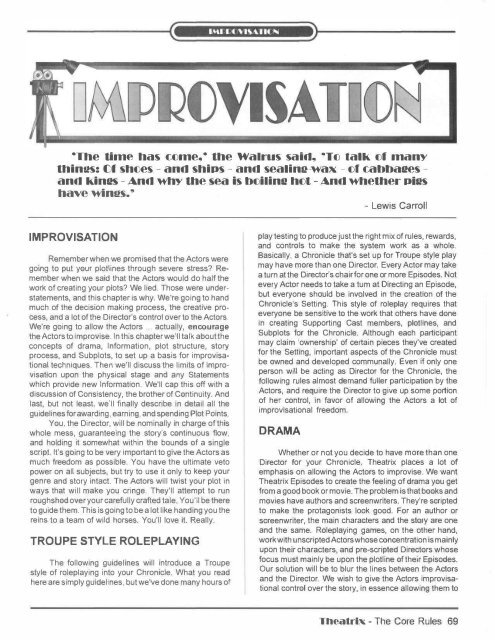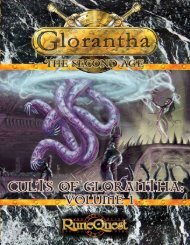Untitled - Index of - Free
Untitled - Index of - Free
Untitled - Index of - Free
You also want an ePaper? Increase the reach of your titles
YUMPU automatically turns print PDFs into web optimized ePapers that Google loves.
The time has cvme the Walrus said •Tv talk vf man"<br />
thines: ()f shves - and shiPs - and sealina-wax - vf cabbaaes -<br />
and kinas - .4nd wh" the sea is bvilin!! hvt- .4nd whether PIUs<br />
have winl!s. <br />
IMPROVISATION<br />
Remember when we promised that the Actors were<br />
going to put your plotlines through severe stress? Re<br />
member when we said that the Actors would do half the<br />
work <strong>of</strong> creating your plots? We lied. Those were under<br />
statements, and this chapter is why. We're going to hand<br />
much <strong>of</strong> the decision making process, the creative pro<br />
cess, and a lot <strong>of</strong> the Director's control over to the Actors.<br />
We're going to allow the Actors ... actually, encourage<br />
the Actors to improvise. In this chapter we'll talk about the<br />
concepts <strong>of</strong> drama, Information, plot structure, story<br />
process, and Subplots, to set up a basis for improvisa<br />
tional techniques. Then we'll discuss the limits <strong>of</strong> impro<br />
visation upon the physical stage and any Statements<br />
which provide new Information. We'll cap this <strong>of</strong>f with a<br />
discussion <strong>of</strong> Consistency, the brother <strong>of</strong> Continuity. And<br />
last, but not least, we'll finally describe in detail all the<br />
guidelines for awarding, earning, and spending Plot Points.<br />
You, the Director, will be nominally in charge <strong>of</strong> this<br />
whole mess, guaranteeing the story's continuous flow,<br />
and holding it somewhat within the bounds <strong>of</strong> a single<br />
script. It's going to be very important to give the Actors as<br />
much freedom as possible. You have the ultimate veto<br />
power on all subjects, but try to use it only to keep your<br />
genre and story intact. The Actors will twist your plot in<br />
ways that will make you cringe. They'll attempt to run<br />
roughshod over your carefully crafted tale. You'll be there<br />
to guide them. This is going to be a lot like handing you the<br />
reins to a team <strong>of</strong> wild horses. You'll love it. Really.<br />
TROUPE STYLE ROLEPLAYING<br />
The following guidelines will introduce a Troupe<br />
style <strong>of</strong> roleplaying into your Chronicle. What you read<br />
here are simply guidelines, but we've done many hours <strong>of</strong><br />
- Lewis Carroll<br />
play testing to produce just the right mix <strong>of</strong> rules, rewards,<br />
and controls to make the system work as a whole.<br />
Basically, a Chronicle that's set up for Troupe style play<br />
may have more than one Director. Every Actor may take<br />
a turn at the Director's chair for one or more Episodes. Not<br />
every Actor needs to take a tum at Directing an Episode,<br />
but everyone should be involved in the creation <strong>of</strong> the<br />
Chronicle's Setting. This style <strong>of</strong> roleplay requires that<br />
everyone be sensitive to the work that others have done<br />
in creating Supporting Cast members, plotlines, and<br />
Subplots for the Chronicle. Although each participant<br />
may claim 'ownership' <strong>of</strong> certain pieces they've created<br />
for the Setting, important aspects <strong>of</strong> the Chronicle must<br />
be owned and developed communally. Even if only one<br />
person will be acting as Director for the Chronicle, the<br />
following rules almost demand fuller participation by the<br />
Actors, and require the Director to give up some portion<br />
<strong>of</strong> her control, in favor <strong>of</strong> allowing the Actors a lot <strong>of</strong><br />
improvisational freedom.<br />
DRAMA<br />
Whether or not you decide to have more than one<br />
Director for your Chronicle, Theatrix places a lot <strong>of</strong><br />
emphasis on allowing the Actors to improvise. We want<br />
Theatrix Episodes to create the feeling <strong>of</strong> drama you get<br />
from a good book or movie. The problem is that books and<br />
movies have authors and screenwriters. They're scripted<br />
to make the protagonists look good. For an author or<br />
screenwriter, the main characters and the story are one<br />
and the same. Roleplaying games, on the other hand,<br />
work with unscripted Actors whose concentration is mainly<br />
upon their characters, and pre-scripted Directors whose<br />
focus must mainly be upon the plotline <strong>of</strong> their Episodes.<br />
Our solution will be to blur the lines between the Actors<br />
and the Director. We wish to give the Actors improvisa<br />
tional control over the story, in essence allowing them to<br />
Theat.-tx - The Core Rules 69



